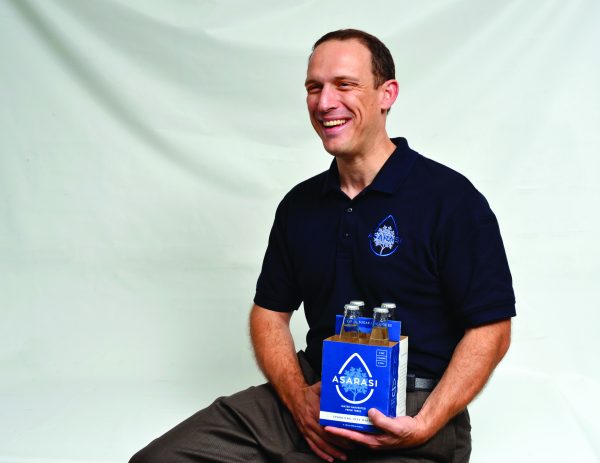“Water, water, everywhere/Nor any drop to drink,” Samuel Taylor Coleridge famously lamented in “The Rime of the Ancient Mariner.” But Coleridge probably wasn”™t thinking of sugar maple trees ”” or the potable water that can be derived from their sap during the maple syrup-making process.
Certainly Adam Lazar wasn”™t. But on a 2008 visit to a Vermont maple farm he learned that after the sugar was removed from the sap, the remaining 97 percent of material ”” “naturally pure tree-drawn water” ”” was being thrown away.
“I was told, ”˜Who would want it? It”™s just water,”™” Lazar recalled. “That”™s when the idea hit me, that here was a renewable resource that could be pretty easily converted from being a waste byproduct to a consumer-priced product. We”™re now offering an eco-friendly bottle of organic water from a source that consumers can trust.”
The “we” is Asarasi (after the Latin word for the maple family, “aceraceae”), the Greenwich-based company that Lazar formed as CEO. Though not particularly ecology-minded at the time, Lazar had spent some 15 years working in the consumer goods field as a product developer. “I”™m also a former military officer,” he said, “so I was used to having limited resources to execute very challenging missions by finding additional resources at my disposal.”
Maple sap is derived solely from the Northeastern United States and Canada. During the spring season, maple trees essentially become organic water-filtering devices, according to Lazar. During the processing of sap into syrup, the pure tree water is removed to obtain maple sugar, and the water component of the sap ”” equaling some 500 billion gallons a year ”” is usually discarded.
The company taps some 30,000 trees at a maple farm in Western New York to produce its wares, Lazar said. “Asarasi”™s subcontracted production and logistics operations are in New York. We produce our products in Western New York as our farm partner and co-packing facility are located there, and we are bottled close by the farm to reduce the carbon footprint of transportation. We also warehouse in Buffalo and drop-ship from that location.”
Executive, administrative, sales and marketing functions are overseen from home-based offices in Greenwich and Newtown, “and we are growing rapidly,” he added. “We are currently reviewing office and warehouse space options in Bristol as we grow.”
Currently made up of Lazar and Chief Marketing Officer Brian Pare, Asarasi expects to become “a significant job creator in Connecticut ”¦ we”™re in the process of hiring some part-time people now.”
Asarasi has applied for a USDA certification of its product, which Lazar described as “a naturally clear, crisp and refreshing bottle of water at a competitive price.” A single bottle sells in stores for $1.89 to $1.99, while four-packs are priced at $6.
Taste of the unflavored product is distinctly crisp and clean. “It”™s an amazingly different product when it”™s refrigerated at 38 to 40 degrees, which we recommend,” Lazar said. “There”™s a variety of flavor profiles at different temperatures.”
As for nutritional value, Lazar says, “We”™re talking about water. Carbonated water ”” we went with carbonated as it”™s a high-growth category, growing at 30 percent-plus annually, and bubbles are fun! Flat water tends to be boring and sparkling is not. But we”™re not playing in the nutritional space, we”™re in the commodity space.”
Asarasi seems to be well positioned in the beverage industry. According to data from the Beverage Marketing Corp., bottled water consumption in the U.S. grew 120 percent, while consumption of carbonated/flavored beverages fell by 16 percent, between 2000 and 2015. The group expects bottled water sales to surpass those of soda by early 2017 at the latest.
Asarasi is being sold at about 70 retailers around the state, and Lazar predicts it will be available at 50 grocery stores by the end of November, including at a number of Geissler”™s Supermarkets, LaBonne”™s Markets, Caraluzzi”™s and ShopRite outlets.
















